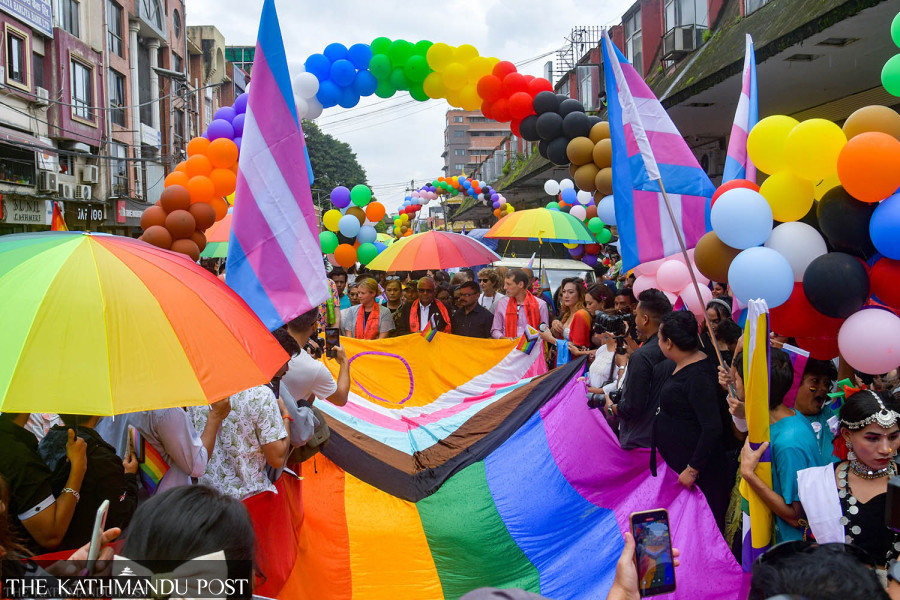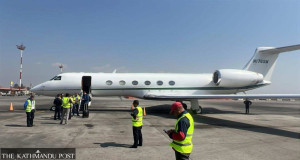National
What Trump’s return means for LGBTQIA+ advocacy in Nepal
Nepali queer rights activists say they are determined to fight back any potential regressive US policies and vow to continue advocacy.
Aarati Ray
Donald Trump is heading back to the Oval Office, defeating Kamala Harris to become the 47th President of the United States. With his return to power, questions arise about how his leadership might affect issues like women’s rights, access to abortion, and LGBTQIA+ advocacy worldwide.
The implications for queer rights globally are hard to ignore—especially for countries like Nepal, where international solidarity and funding have propelled LGBTQIA+ advocacy.
“If US support dries up, it could create challenges for queer movements worldwide, not just in Nepal,” says Manisha Dhakal, executive director of Blue Diamond Society, a pioneering LGBTQIA+ rights organisation in Nepal.
Her concerns aren’t misplaced. Trump’s first presidency (2017–2021) dismantled key protections for queer communities, setting a troubling precedent.
Organisations in the US have already spoken out against Trump’s policies. The American Civil Liberties Union (ACLU), a prominent civil rights organisation, released a detailed 10-page analysis of his administration, pledging to mobilise their network to counter these ‘dangerous policies’.
During his first presidency, Trump rolled back key protections for LGBTQ+ individuals across multiple sectors, including healthcare, education, employment, and housing.
Transgender individuals faced targeted actions, including a ban on serving openly in the military and the removal of LGBTQIA+ content from federal websites. LGBTQIA+ references were removed from a 2020 draft update of USAID policy, and repeated budget cuts to PEPFAR (President’s Emergency Plan for AIDS Relief) undermined global efforts against HIV/AIDS.
Trump’s Project 2025 proposals indicate even more extreme measures in his second term. These include banning gender-affirming care for minors, restricting federal funding for schools teaching ‘gender ideology’, and enforcing a binary gender recognition policy based on sex assigned on birth.
Teachers suggesting alternative gender identities could face severe consequences. Transgender individuals could also be barred from participating in sports aligning with their gender identity.
Internationally, such actions would expand anti-rights ideologies, as seen with Trump’s 2020 submission of the Geneva Consensus Declaration to the UN, an anti-LGBTQ+ and anti-abortion document.
“During his first presidency, Trump removed the US special envoy for LGBTQ+ rights…. while Biden restored it, Trump is likely to do the same again,” says Sunil Babu Pant, a pioneer of the LGBTQIA+ movement in Nepal and South Asia’s first openly queer lawmaker. “His stance on banning transgender rights will lead to serious setbacks for queer rights.”
Dhakal says, “We stand in solidarity with LGBTQIA+ organisations in the US, Nepali LGBTQIA+ individuals in the US and oppose any action against human rights.”
Dhakal’s organisation, Blue Diamond Society, has collaborated with several US-based human rights organisations, including Outright International, Save the Children, and USAID on various projects.
Currently, they are running a project focused on HIV service delivery with USAID’s support, and it continues without any interruptions. They have not yet faced any funding issues or prohibitions.
They had another project with USAID before Trump’s first term, which also continued with support throughout his presidency. “Trump’s second term begins in January, and while we’re uncertain about what may happen, we remain optimistic,” says Dhakal.
While Dhakal hasn’t participated in formal discussions with donor agencies or international queer rights coalitions yet, informal talks regarding Trump’s administration have taken place during review meetings.
“Strong financial support helps sustain momentum, expand visibility, and reach more people,” says Sarita KC, the executive director of Mitini Nepal. “This doesn’t mean that queer advocacy in Nepal will come to a halt without US support.”
According to KC, Nepal’s queer advocacy has not been entirely dependent on US funding but rather benefited from their solidarity. International conferences hosted by US organisations, she says, have provided platforms for activists worldwide to collaborate and devise solutions. “If such conferences and their associated activities diminish, we will adapt and find new ways,” KC says. “Virtual meetings could be an alternative.”
Mitini Nepal has not directly accessed USAID funds but has received support from some US-based international donors. While there have been discussions about potential funding challenges from donors, KC says that support from other countries, including the UK, Germany, and Finland, has started to grow. She believes this could counterbalance any reductions in US support.
“I don’t think USAID, which considers human rights one of its core pillars, will pull out support for queer rights completely,” Dhakal says. “The agency would likely continue its support, either directly or indirectly.”
While Obama and Biden’s administrations supported LGBTQIA+ rights, Trump’s stance is different. Given the US’s global influence, its policies will ripple across South Asia. Pant says that Trump’s anti-LGBTQIA+ policies and provocative remarks will embolden conservative and religious groups in South Asia, including Nepal.
The effect has already been seen.
Two months ago, a new political party Aamul Paribartan Nagarik Party in Nepal introduced an agenda aligning with Trump’s election anti-abortion and anti-queer campaign stance and did a protest rally in Maitighar opposing homosexuality, gender transition, and abortion.
Recently, KC from Mitini Nepal attended the Equal Rights Coalition conference in Berlin, Germany on December 17 and 18 where discussions centred around the rise of global anti-gender and anti-queer movements. Speculations were raised about Trump’s campaign being a driving force behind these movements. “In Nepal and neighbouring countries, anti-queer sentiments are gaining momentum,” KC says. “Such agendas are likely encouraged by external powers promoting anti-queer rhetoric.”
Pant, who is also the executive director of Mayako Pahichan Nepal, adds that activism should not rely solely on foreign donors. “We should become stronger within our nation with government support,” he says.
According to Pant, Nepal’s LGBTQIA+ movement began in a challenging era and has seen worse. “While it’s a concern worth discussing, we shouldn’t be overly frightened by foreign shocks,” he adds. “Nepal’s constitution and laws won’t change overnight just because of Trump’s words.”
Dhakal, too, thinks that Nepal, as a sovereign nation, should not be swayed by potential US policy changes under Trump. “Nepal has its own constitution and judicial support for LGBTQIA+ rights,” she says. “We shouldn’t adopt negative practices, even from powerful nations.”
Dhakal, who is also a founding member of the Asia-Pacific Transgender Network and board member of the International Reference Group on Transgender Women and HIV/AIDS (IRGT), says that their advocacy will continue no matter what. “We in South Asia will join forces with international human rights and queer rights organisations to support queer rights in the US and worldwide,” Dhakal says.
“Nepal should speak in international forums and conventions against anti-queer activities. If Nepal remains progressive, it can set an example,” Dhakal adds. “Even a global power can learn from small nations.”




 9.88°C Kathmandu
9.88°C Kathmandu















